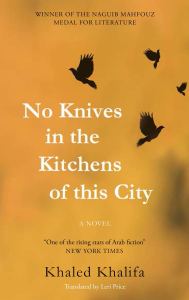No Knives in the Kitchens of this City
 This review of the latest novel by Khaled Khalifa – an examination of Aleppo’s decades-long strangulation at the hands of the Assad regime – was published at the Guardian.
This review of the latest novel by Khaled Khalifa – an examination of Aleppo’s decades-long strangulation at the hands of the Assad regime – was published at the Guardian.
Were Syrians wise to revolt? Aren’t they worse off now?
Such questions misapprehend the situation. Syrians didn’t decide out of the blue to destroy a properly functioning state. The state had been destroying them, and itself, for decades. “No Knives in the Kitchens of this City”, the new novel by Khaled Khalifa, chronicles this long political, social and cultural collapse, the incubator of contemporary demons.
The story stretches back to World War One and forward to the American occupation of Iraq, but our narrator’s “ill-omened birth” coincides with the 1963 Baathist coup. The regime starts off as it means to continue. The maternity hospital is looted and emptied of patients. Soon the schools and universities are purged. Only pistol-toting loyalist professors survive. Public and individual horizons shrink as the president’s powers grow beyond all limits, through Emergency Law, exceptional courts, and three-hour news broadcasts covering “sacred directives made to governors and ministers”.
The novel follows a large and well-drawn cast – a family, their friends, enemies and lovers – back and forward across three generations. This multiple focus and enormous scope turns the setting – the city of Aleppo – into the novel’s central ‘character’. “Cities die just like people,” Khalifa writes. So ancient neighbourhoods are demolished, and lettuce fields give way to spreading slums.
“No Knives in the Kitchens of this City” won the Naguib Mahfouz Medal for Literature. As in many of Mahfouz’s novels, Khalifa’s urban environment develops a power somewhere between metaphor and symbol: “The alley was witness to the destruction of my mother’s dreams, and the idea of this alley grew to encompass the length and breadth of the country.”
During the low-level war in the early 1980s between regime and Muslim Brotherhood, Aleppo becomes “a place of retribution”. This conflict was the setting for Khalifa’s earlier prize-winner “In Praise of Hatred”, but here the focus moves from political violence to the social and psychological violence – harassment, rape, ostentatious suicide – which comes in its wake.
The narrator’s uncle Nizar is one of several gay characters. Scorned by half the family, once imprisoned for ‘sodomy’ and raped inside by a mosque imam, he finds brief freedom in Beirut, until his money runs out. Khaled Khalifa believes that “it is the duty of writing to help break down taboos and clash with fixed and backward concepts.” He is by no means the first Arab novelist to write about homosexuality, but he treats the topic with greater sensitivity and sympathy than, for instance, Alaa al-Aswani does in “The Yacoubian Building”.
Nizar’s niece Sawsan, whose constant epithet is “irrepressible”, swings between the extremes available. As a student she joins a regime militia, informs on her friends, and forcibly removes hijabs. After sojourns in Dubai and Paris she returns home, has her hymen repaired, and immerses herself in prayer.
Her brother Rashid, an accomplished violinist, echoes her trajectory. At first wearing ear plugs and disdaining “the herd”, he later throws himself into it, pursuing jihad in occupied Iraq.
Shame is a key theme, and the general rage for orthodoxy, sexual, religious and political. A woman is stripped naked in the street for refusing a badge bearing the president’s face. And Aleppo’s “capitulation to shame [is] made manifest in the posters and slogans and symbols hung on its walls.”
Not surprising in this context that the characters are often depicted toiling hard to forget their desires, ugly compromises, or snatches of happiness. But their willed forgetfulness contributes to the city’s destruction:
“Aleppo itself was as ephemeral as the act of forgetting; anything which remained of its true form would become a lie, reinvented by us day after day.”
So people must also commit to a desperate, and suspect, remembering. The past is “the sole reason for living”, narrated “in revenge for a present” too terrible to contemplate. The novel (and Khalifa too, writing from war-struck Damascus) remembers Aleppo’s cinemas and haute cuisine, its music recitals and surrealist poetry, its café and bar culture, its prostitutes and shrines.
The novel sounds very like an elevated form of gossip, each story generating more stories, each anecdote opening into further digression. It has the sense too of a lament. With an obsessive circularity, four of five chapters begin with the narrator’s mother’s death.
It is intricately plotted, chronologically complicated, and a pleasure to read. The profusion of characters somewhat defuses narrative urgency, but what the novel loses there it gains in psychological and social depth. The writing itself is superb – a densely detailed, luxurious realism pricked with surprising metaphors. It is lyrical, sensuous, and so semantically heavy that at times it resembles a prose poem. This effect is occasionally marred by slightly clumsy translation.
“No Knives in the Kitchens of this City” is a sad but beautiful book which provides important human background to the escalating Syrian tragedy.


Leave a comment